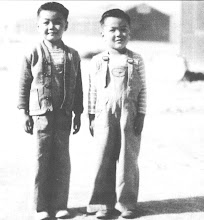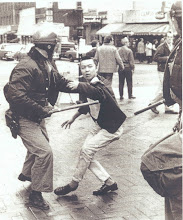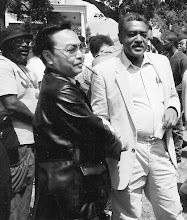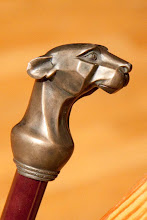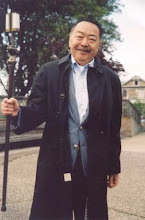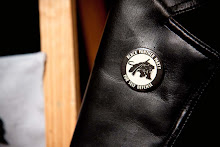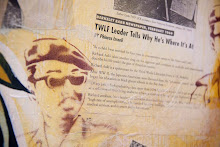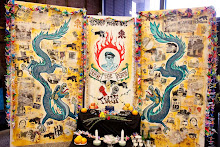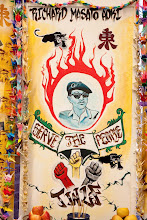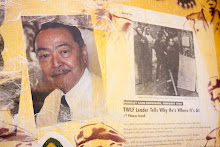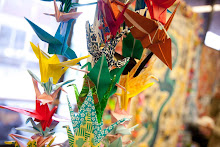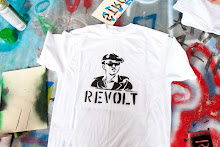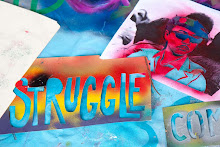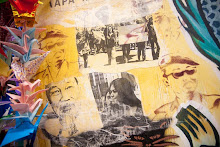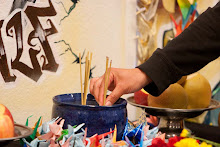Wednesday, April 10, 2019
Tuesday, August 28, 2012
March 15, 2010
During
the immediate aftermath of Richard's passing, Richard's friends and
comrades focused on a public honoring of Richard's legacy while
respecting his personal privacy which he was known to value. At
this one year anniversary of Richard's passing, the sufficient grieving
time has enabled his friends to share more details about the medical
conditions that led to Richard’s death.
To
the very end, Richard, like many of us, was far more willing to trade
stories with his friends about the country’s latest economic disasters,
revolutionary politics, and, of course, the odds on weekly football
games than to talk about his poor health. He couldn’t avoid the topic when he was literally stopped in his tracks a few years ago by a major stroke. When
he collapsed in his bathroom his recovery was further complicated by a
heart attack, kidney failure and multiple painful leg fractures. In
the years following his stroke Richard credits his recovery to the
steady stream of support from his friends who called him daily, gave him
rides to his appointments and filled his refrigerator with home-cooked
meals.
Despite his close network of support and his best efforts to stop smoking, Richard’s health continued to deteriorate. The very same disease process that led to his stroke made it painful for him to walk and was slowly shutting down his kidneys. He
was embarrassed to admit that for more than a year, he had trouble
eating. Hospitalized in January, Richard checked himself out of the
hospital to be at his mother’s bedside when she suffered a fatal heart
attack. Still unable to eat, exhausted, and feeling ill, Richard managed
to arrange a quiet loving funeral service for his mother. A few weeks after her funeral, on March 5, 2009 while with friends, he collapsed at the local drug store and was taken by ambulance to Alta Bates hospital.
It was a rocky hospitalization. Dialysis
was proposed to treat his failing kidneys, but in his debilitated
condition his body couldn’t tolerate even his first run of dialysis.
When they tried again, on his second run, his heart stopped momentarily,
and still he continued to lose fluids. Saturday
afternoon on March 14, 2009 Richard asked to be discharged and returned
home. He knew his next dialysis treatment was scheduled for Monday. He awoke early Sunday morning, got up and collapsed. Assisted
to the couch he was asked if he wanted to return to the hospital.
Instead, less than five minutes later, when he was alone, Richard shot
himself and passed away in the emergency surgical unit.
Throughout
his life, Richard carefully made decisions on what paths he decided to
take, whether it was joining the army, participating in the formation of
the Black Panther Party, enrolling at UC Berkeley, joining the Asian
American Political Alliance, or becoming a leader in the UC Berkeley
Third World Liberation Front Strike. He weighed his options and carefully deliberated all his decisions. His final decision to end his worsening medical condition was consistent with his wish not to return to the hospital.
Although
Richard did not have an immediate family after the death of his mother,
he had a large extended family of loving friends and comrades whom were
very close to him. He lived a full and accomplished political and social life. His
caring thoughtfulness and ever present sense of humor gave him an ever
widening circle of close friends wherever he went, even at his physical
therapy class. He will be remembered not only for
his revolutionary leadership, but also as a tender friend, for his
willingness to listen and share his knowledge with all he met, and his
wonderful wit and hilarious stories that kept us rolling off our chairs.
On
May 3, 2009 over 500 of his friends, family, and community celebrated
his life and contributions in a memorial on UCB campus. Honor
guards from the Black Panther Party Alumni and Black August Organizing
Committee lined the memorial stage. Heartfelt tributes filled the
program from old and new comrades with music and performance. A
community of artists constructed a people’s altar adorned with over
1000 paper cranes made by bay area community members, while drummers
performed a Korean ritual ceremony.
On
May 4th at the Chapel of the Chimes a memorial service of 200 crowded
into the chapel to bid Richard a final personal farewell. A large
portrait of Richard from a photo taken of him at a Bobby Hutton BBP
Alumni commemoration was placed in the front of the assembly. The two hour program included added farewells from his friends and family. A third honor guard, the United States military corps, presented a formal veteran’s honor taps and salute with a flag to his family. While
some attendees were critical of this show of respect, the majority in
attendance were not lost to the irony of this military veteran’s
recognition from a government he fought against for civil and human
rights. The memorial concluded with a Panther alumni leading all in
singing Power to the People.
Other
formal tributes given to Richard were recognition from the Oakland City
Council, SF Board of Supervisors, and Congresswoman Barbara Lee. Additionally
the Asian American Pacific Islander UCB Alumni Chapter awarded Richard
Aoki Scholarships to two Eastbay youth for community service in the
organizations Youth Together and Serve the People.
Richard
will always be remembered for his legacy as a revolutionary, a fighter
for all people, an educator and mentor for youth, as one of the Black
Panther Party founding members, a leader of the TWLF which helped give
birth to Ethnic Studies around the country, and as a leader in uniting
Third World struggles in America.
We miss you Richard,
Richard Aoki Memorial Committee
Friday, April 3, 2009
Community Altar Built
Rest In Power
Richard Masato Aoki
Community Altar
We invite you to remember and celebrate our friend, comrade, and hero Richard Masato Aoki by giving an offering to a community altar at EastSide Arts Alliance (2277 International Blvd, Oakland CA, 94606).
There are a couple ways you can contribute:
- Introduce and educate people in your circles and organizations on who Richard is and was (See attached writings on Richard for background information.).
- The altar will be up from April 7th through April 27th outside of EastSide and will be accessible to anyone who wants to leave writing, prayers, flowers, or other items.
- On April 13, 15, 20, and 22, from 4 – 6 p.m., Peps (an EastSide staff) and volunteers will be available to assist youth and community members in adding to the altar through collages or origami.
- We hope to collectively make 1000 cranes as a prayer for justice and self determination as well as a wish for his legacy to be carried on for many generations to come. You can make a number of cranes and deliver them to EastSide. Volunteers will string them up for the commemoration on May 2nd and 3rd.
Friday, March 20, 2009
Thursday, March 19, 2009
Wednesday, March 18, 2009
Subscribe to:
Posts (Atom)










